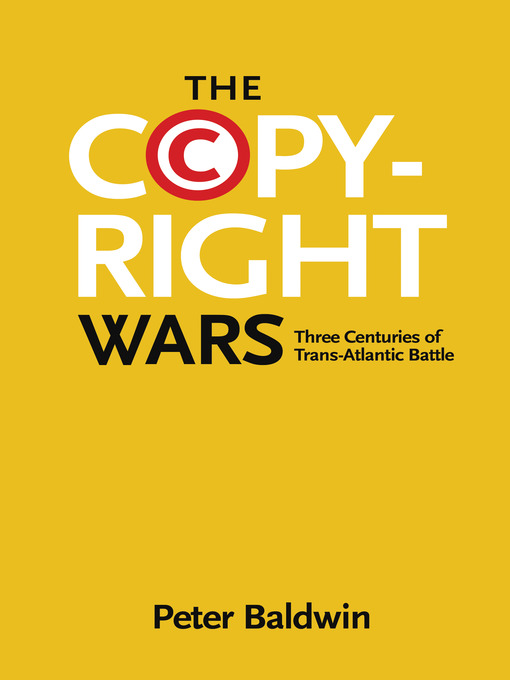
The Copyright Wars
Three Centuries of Trans-Atlantic Battle
کتاب های مرتبط
- اطلاعات
- نقد و بررسی
- دیدگاه کاربران
نقد و بررسی

Starred review from September 15, 2014
Baldwin (The Narcissism of Minor Differences: How America and Europe Are Alike), a history professor at UCLA, takes on the history of copyright, with all its deep artistic and moral quandaries, in this incisive work that cuts through the warren of legal and legislative wrangling endemic to intellectual property law. Baldwin expertly and economically records the major beats of copyright history in the last 300 years in a surprisingly focused, readable narrative. The author shines a light on the fundamental question that animates all sides of the copyright debate: should copyright exist primarily to protect the rights of creators or the rights of consumers and the cultural progress? Yet, he finds that one side of the debate has prevailed in the last century—the scales have clearly tipped in favor of creators, with copyrights becoming “longer and stronger.” In discussions ranging from the origins of copyright in 18th-century England, through the rise of “moral rights” in Europe and the transition of the U.S. from global pirate to a net exporter of cultural works in the 19th century, to present day battles over Google Book Search and thorny legislation, such as the Stop Online Piracy Act (SOPA), Baldwin both illuminates the past and neatly sketches the contours of the battles to come. “Ultimately,” Baldwin reminds us, “the issues at stake are political and ideological. Nature has precious little to say about how intellectual property is justified.”

September 1, 2014
A thoroughgoing survey of copyright, intellectual property and other thorny legal issues of the age of information. Generally, problems of copyright are first-world problems-and problems they are, if often manifested in incremental ways. Remember, for instance, the battle over colorizing classic black-and-white films a couple of decades ago? As Baldwin (History/UCLA; The Narcissism of Minor Differences: How America and Europe Are Alike, 2009, etc.) notes, the issue hinged less on aesthetics than the wishes of the producers-that is, the studios and corporations that owned adaptation rights-to reauthorize copyright. This was easier to accomplish in the corporation-friendly "Anglo-Saxon world" than in Europe "because the film copyright owner tended to be the corporation that made it, not the director." This explains the growing clout-wielding of corporations. Baldwin coherently covers the distinctions among economic rights and "moral" rights, the latter of which have been more difficult to establish, and he examines these rights against the background of a variety of legal traditions-surprisingly among them that of Nazi Germany, which placed a premium on "spiritual values above modern materialism" and gave unusually comprehensive protection to authors (non-Jewish authors, anyway). Baldwin's discussion of contending traditions and rights carries over into exquisitely latter-day concerns, especially the ever more common question of plagiarism, which, he says, is "increasingly seen as a mere peccadillo"-unless, of course, it's the intellectual property of the big corporations that is being ripped off. Ironically, as he observes, though the right to ownership of such property is enshrined in this country, it has been extended again and again against the intentions of the Founders, who saw it as being of limited duration against the common good of the "educational aspirations of a fledgling democracy." Scholarly but accessible and lucid; essential for students of modern intellectual property law and of much interest to a wide audience of writers, journalists, publishers and "content creators."
COPYRIGHT(2014) Kirkus Reviews, ALL RIGHTS RESERVED.

Starred review from November 1, 2014
The Anglo-American tradition is that copyright exists to benefit the public, not the author, but the reverse theory holds sway today. America's first copyright law presumed everything was in the public domain unless a copyright was applied for, and then the item was protected for 14 years, renewable once. Now, copyright automatically exists in every doodle and lasts the author's life plus 75 years. Baldwin (history, Univ. of California at Los Angeles; The Narcissism of Minor Differences) charts how the interests of copyright holders triumphed over the public interest. He maintains that the French are largely responsible, turning into law romanticized 19th-century notions of the lone tortured visionary author atop Mount Parnassus, then imposing those ideas abroad. Thus, lengthy terms and harsh criminal punishments for infringement now reign worldwide. Authors largely don't benefit, but rather the corporations that control the rights. Or distant relatives who use "moral rights" to suppress works--or shake down today's creators. Quite a change for America, where in the 19th century, foreign works couldn't be copyrighted and were freely pirated. Authors such as Charles Dickens and Walter Scott were popular in part because they weren't getting paid. VERDICT An excellent, scholarly study of what has gone wrong with American copyright law in the last half-century that will contribute to the ongoing debate on reforming the law.--Michael O. Eshleman, Bloomington, IN
Copyright 2014 Library Journal, LLC Used with permission.

























دیدگاه کاربران